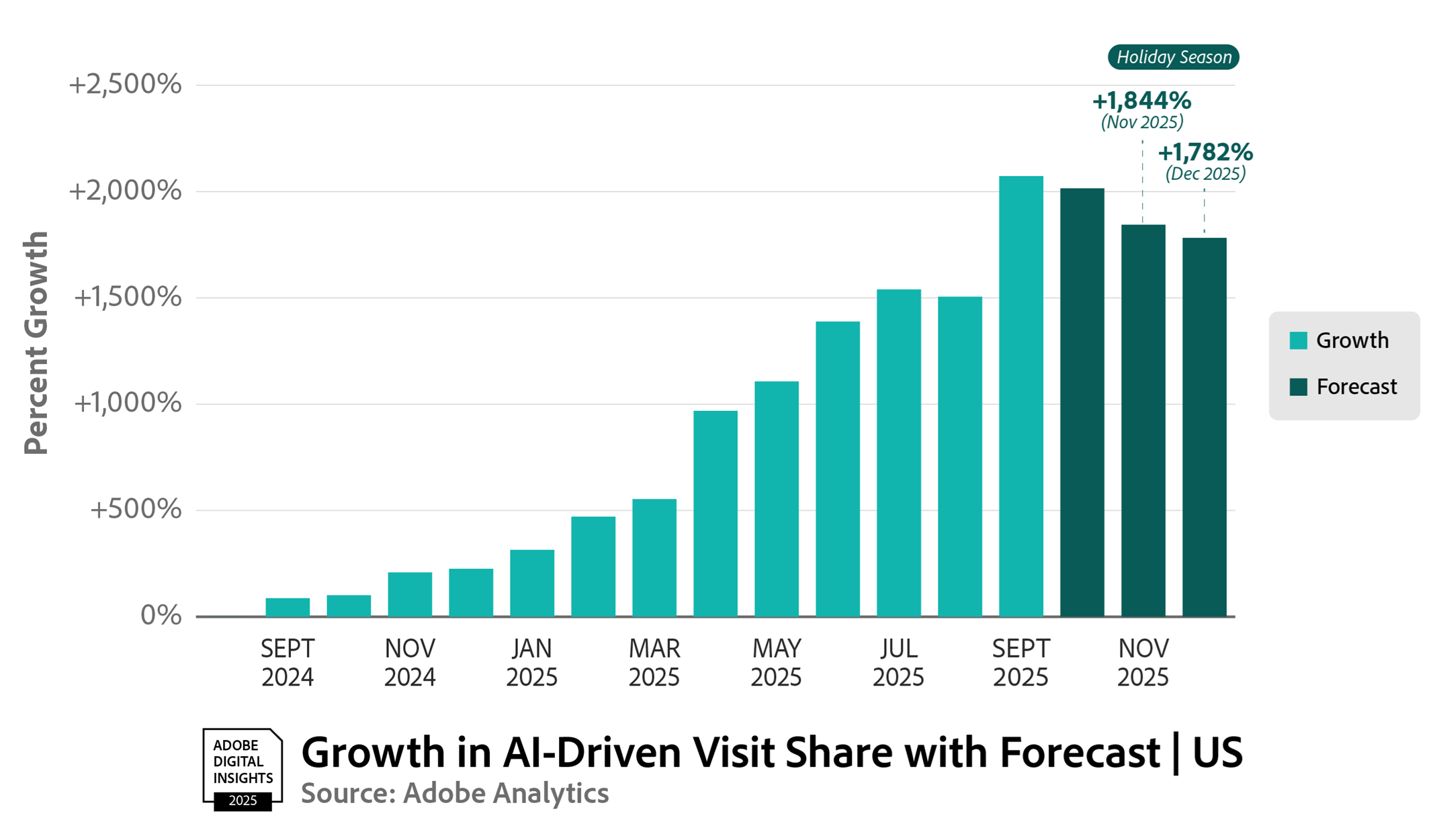AI shopping assistants are reshaping holiday retail – and you might already be using one without realizing it
This year will see a 520% surge in AI-assisted shopping

Sign up for breaking news, reviews, opinion, top tech deals, and more.
You are now subscribed
Your newsletter sign-up was successful
- Adobe is forecasting a 520% surge in AI-driven traffic to retail sites during the 2025 holiday season.
- Shoppers are relying on chatbots for gift recommendations and deal hunting.
- Over a third of US consumers have already used AI tools to shop online.
Your holiday shopping this year is likely to have a lot of help from AI, according to a new report from Adobe. This year's holiday e-commerce forecast predicts a whopping 520% jump in AI-driven traffic to US retail websites.
AI's presence in holiday shopping spiked last year by 1,300%, but the ten days leading up to Thanksgiving will see AI's retail aid hit new heights. The forecast is based on more than 1 trillion site visits. The expected $253.4 billion spent online between November 1 and December 31 would be a 5.3% bump from last year, regardless, but the role of AI and its adoption for shopping is remarkable.
The “AI traffic” Adobe refers to doesn’t necessarily mean a robot is buying you socks. Instead, it tracks when people land on e-commerce sites via a recommendation or link generated by an AI interface. That might be a chatbot. It might be an AI-powered browser sidebar. It might be an auto-suggest tool in an online marketplace. What matters is the role AI now plays.

It helps that more than a third of those responding to Adobe’s survey of 5,000 U.S. consumers have already used AI for online shopping. A majority of 53% cited AI as a research tool, with 40% saying they use AI for product recommendations, while 36% say AI helps them find deals, and 30% reported using AI for gift inspiration.
Let’s say you’re trying to find a gift for your nephew who’s getting into photography and want to shop the best cameras. A couple of years ago, you might have opened a bunch of tabs and watched some videos and reviews. Perhaps a year ago, you would have used a browser extension to scrape price comparisons. This year, the move would be just to ask ChatGPT or Gemini: “What’s a good beginner DSLR camera under $700 with video features?” You'd get a shortlist with pros and cons, the latest prices and offers, and links to videos and other details. A couple of clicks and the shopping journey is over.
AI e-commerce
People seem to be happy about AI shopping aids. Adobe noted that shoppers arriving via. AI sources tend to stick around and browse more pages. While actual purchases from AI referrals last year were low, they've begun to rise.
And while social media remains a major source of people's interest in a product, AI is helping there too, allowing. Shoppers can paste a screenshot or link into an AI tool and say, “Find this in size medium,” or “Show me similar styles under $80,” and get useful links.
Sign up for breaking news, reviews, opinion, top tech deals, and more.
With ChatGPT beginning to offer apps, it seems inevitable that retail shopping won't be part of the catalog. Where brands once fought for search rankings or shelf space, the next battlefield might be relevance from an LLM chatbot. What products the AI recommends, and how it ranks them, could make or break sales.
2025 is shaping up to be the year AI earns a spot on your shopping list, not as a gift, but as a co-pilot, and the conversational nature of the search means you might not even realize how often it’s already shaping your shopping.
Follow TechRadar on Google News and add us as a preferred source to get our expert news, reviews, and opinion in your feeds. Make sure to click the Follow button!
And of course you can also follow TechRadar on TikTok for news, reviews, unboxings in video form, and get regular updates from us on WhatsApp too.
You might also like...

Eric Hal Schwartz is a freelance writer for TechRadar with more than 15 years of experience covering the intersection of the world and technology. For the last five years, he served as head writer for Voicebot.ai and was on the leading edge of reporting on generative AI and large language models. He's since become an expert on the products of generative AI models, such as OpenAI’s ChatGPT, Anthropic’s Claude, Google Gemini, and every other synthetic media tool. His experience runs the gamut of media, including print, digital, broadcast, and live events. Now, he's continuing to tell the stories people want and need to hear about the rapidly evolving AI space and its impact on their lives. Eric is based in New York City.
You must confirm your public display name before commenting
Please logout and then login again, you will then be prompted to enter your display name.